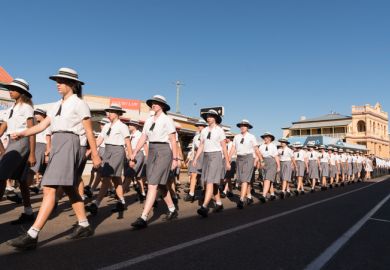Author: David Blundell
Edition: First
Publisher: Bloomsbury/Continuum
Pages: 224
Price: £70.00 and £22.99
ISBN: 9781441178848 and 1847060259
As politicians are fond of saying, "children are our future"; but as an educational sociologist I sometimes wonder if society has forgotten what children are there for. Indeed, I often seethe at examples of hard-sell marketing to children, especially if it involves something pink, plastic and promoting the early sexualisation of girls. I often turn to the philosophers and authors of the past who have debated the question of childhood at length, and it is for this reason that discussions about historical understandings of childhood feature prominently in my lectures.
Until now, I have mainly had to develop my own materials for students but this book will change all that, as it is a clever round-up of conceptualisations of childhood from the Renaissance onwards. Everything is there: philosophers such as Philippe Aries, Rene Descartes, Jean-Jacques Rousseau and Immanuel Kant; policy and the various English Education Acts; the role of schooling in society; and the influence of famous educationalists including Maria Montessori, Johann Pestalozzi and Friedrich Froebel. However, rather than being exclusively chronologically sequenced, the book has six lines of enquiry running through it, namely: moral contexts; influence of theology and religion; influence of progressive ideals; contemporary connections between education, health and social care; the role of mass schooling; and childhood as "futurity".
This will enable students to gain a thorough understanding of the interconnectedness of different aspects of the literature. Chapter 6, entitled "State schooling and the construction of 'public childhoods'", is particularly well written in this regard. It provides a historical perspective on publicly funded education in England, including dame schools, compulsory schooling after the 1870 Education Act, the discovery of the "ineducable child" and connections with public health policy and empire. Copious examples from primary sources bring the past to life, and are drawn together through the synthesis of different theoretical positions. In the text, we see children moving from being active agents in their lives (such as in the writings of Rousseau) to being recipients of national policies on what constitutes the norm for children of particular ages and backgrounds.
Later in the book, the prospects for children to become enabled, active citizens in the 21st century are not painted much more brightly, and the book concludes by arguing that children's poverty, lack of social power and political subordination cannot be addressed simply through theorising. However, the book urges us on to embrace the challenge during tough times. In that sense it presents both a synopsis of the historical position of childhood, and a manifesto for the future.
Who is it for? Undergraduate and postgraduate education and social science students, and teacher trainees interested in the history of childhood.
Presentation: Accessible, comprehensive and scholarly.
Would you recommend it? Yes, perfect for a reading list.
Register to continue
Why register?
- Registration is free and only takes a moment
- Once registered, you can read 3 articles a month
- Sign up for our newsletter
Subscribe
Or subscribe for unlimited access to:
- Unlimited access to news, views, insights & reviews
- Digital editions
- Digital access to THE’s university and college rankings analysis
Already registered or a current subscriber? Login



